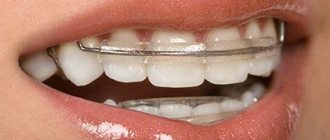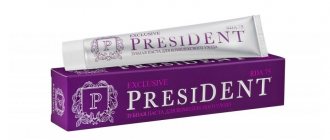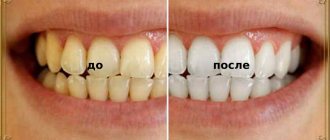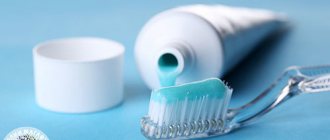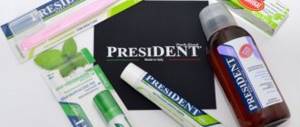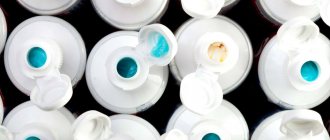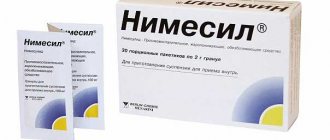Various powdered teeth cleaning products have been used by people since time immemorial. In its modern form, tooth powder, which consisted of crushed chalk, appeared at the end of the 18th century.
Since then, the components and manufacturing technology of this hygiene product have been changed and modernized. Even the appearance and distribution of toothpaste could not completely displace the powder from the shelves - it is still sold in pharmacies and stores, enjoying significant demand.
Popular tooth powders and their composition
The base of tooth powder has remained virtually unchanged since its invention - it is chalk, first crushed, then chemically precipitated.
Chalk is an excellent abrasive that removes plaque and can soften tartar. Due to its abrasive properties, it is also an excellent bleaching agent.
However, the taste of chalk in itself is not pleasant, so a variety of essential oils are added to tooth powders - anise, mint, clove, cinnamon and many others.
They not only give the product a pleasant aroma and improve its taste, but also have antiseptic and anti-inflammatory properties.
The modern range of tooth powders is distinguished by significant diversity. Today in stores you can find products with a variety of tastes and properties: refreshing, whitening, anti-inflammatory, and so on. However, the most popular are the “classic” varieties of tooth powders, known since the middle of the last century - “Special”, “Family”, “Mint”, the recipe of which has remained virtually unchanged for decades.
"Special"
This is the most famous and popular powder, which can be called a kind of product standard. It contains the following ingredients:
- calcium carbonate (the main component of chalk, isolated chemically);
- sodium bicarbonate (also known as baking soda);
- sea salt;
- peppermint essential oil;
- anise essential oil;
- coriander essential oil.
Powder Special
There is another type of powder under the same name, but with a different composition:
- calcium carbonate;
- sodium saccharinate (saccharin);
- orange essential oil.
This product is great for those who don't like the minty flavor of the classic "Special" powder. Orange essential oil gives it a pleasant citrus aroma and also has antiseptic properties.
Saccharin is used to lightly sweeten the powder and is also an antiseptic.
"Family"
The “family” powder has a slightly less complex composition - for example, it does not include sea salt, which is too strong an abrasive for the thin enamel of children's teeth. This is a universal remedy that is suitable for both adults and children.
The powder contains:
- calcium carbonate;
- sodium bicarbonate;
- peppermint oil;
- anise oil;
- coriander oil;
- sage oil
Family powder
Some manufacturers add menthol to the product.
"Mint"
The composition of this product is extremely simple, there is nothing superfluous in it - only abrasive and menthol to add aroma.
This inexpensive product is available to everyone.
Composition includes:
- calcium carbonate;
- peppermint oil;
- menthol.
"Bleaching"
The name speaks for itself - this product really does an excellent job of whitening teeth thanks to the abrasive properties of calcium carbonate and lemon oil. It's also great for family use - the minty flavor is perfectly balanced by the addition of saccharin.
The powder contains:
- calcium carbonate;
- sodium bicarbonate;
- lemon oil;
- peppermint oil;
- sodium saccharinate.
Whitening powder
Today, due to the growing popularity of natural hygiene products and phytocosmetics, the demand for tooth powders has increased, and their range has been replenished with a variety of exotic options, such as powders made entirely from herbs or with the addition of various minerals.
There are also medicinal powders used for gum inflammation. However, they are still less common than the “classic” options.
What we are dealing with: what is in the product
To find out what benefits and harm powder can bring to teeth, you first need to understand what it is, what it consists of, and why this method of cleansing enamel is good and useful. Essentially, this is the same paste, only in dry form and without the addition of artificial components that enhance effectiveness. Due to the fact that the powder consists of a huge number of tiny abrasive particles, it provides high-quality cleaning from plaque. The effect becomes noticeable after 2-3 applications. Today in the assortment you can find different types of dry cleaning compositions, and all of them can differ in the following parameters:
- aromatic and flavoring additives,
- additional natural ingredients,
- the purpose of the effect is to whiten teeth, heal and strengthen hard tissues, remove yellow plaque, which is especially important for a smoker.
Tooth powder is the same paste, only in dry form and without the addition of artificial components.
The product is sold in compact round boxes with a tight-fitting lid. It should be stored in a dry place protected from moisture.
The benefits and harms of powdered teeth cleaning products
Not so long ago, tooth powder was the only means of maintaining oral hygiene - there were simply no alternatives. However, with the advent of toothpastes, it became possible to take a critical look at this product and evaluate its advantages and disadvantages.
Among the clear advantages are:
- environmental friendliness - tooth powders contain exclusively natural ingredients;
- efficiency - abrasive substances contained in powders, such as calcium carbonate and baking soda, reliably remove even old plaque from teeth;
- whitening properties - abrasives not only remove plaque, but also polish the enamel, significantly brightening the teeth;
- anti-inflammatory properties - due to the presence of essential oils, powders reduce inflammation and are recommended for various forms of periodontal disease, as well as for the preventive strengthening of gums;
- antiseptic properties - essential oils help reduce the number of bacteria in the oral cavity;
- remineralization of tooth enamel - such products help saturate the enamel with minerals (especially powders with sea salt);
- equalizing the acid-base balance in the oral cavity - tooth enamel is very sensitive to the effects of acids, which are released in certain quantities at each meal; Due to the pronounced alkaline properties of calcium carbonate and soda, tooth powder reduces acidity in the mouth.
However, this tool also has disadvantages:
- inability to use frequently – due to the high abrasive properties of calcium carbonate, daily use of tooth powder can lead to abrasion of the enamel. For people with thinning enamel and increased tooth sensitivity, such products are completely contraindicated;
- the inability to add some active ingredients (for example, fluoride) due to the powder form;
- leaky packaging, into which pathogenic bacteria can penetrate (especially if you have the habit of dipping the brush into the powder rather than pouring it on top);
- the risk of allergies to the essential oils contained in the composition.
You can see that tooth powder has much more advantages than disadvantages. However, negative consequences cannot be completely ignored, and in order to avoid them, you need to follow certain recommendations for use.
Homemade recipe
The homemade powder recipe is very simple; the main difficulty is to grind all the components as much as possible. To do this, you can use a regular mortar and pestle, take a good blender or an electric coffee grinder.
To prepare, you will need white clay and medicinal herbs, which can be bought at the pharmacy and used in any composition and quantity (sage, oak bark, thyme, black pepper, etc.).
All components must be crushed and mixed well . Finally, you can add 1-2 drops of essential oil, such as eucalyptus.
From all of the above, we can draw a simple conclusion - you shouldn’t limit yourself to just one type of dental cleaner . For most people, a combination of toothpaste and powder is ideal.
This will help not only make the enamel lighter, ridding it of various deposits, but also minimize the negative impact of abrasive components, providing complete comprehensive care for the entire oral cavity.
If you find an error, please select a piece of text and press Ctrl+Enter.
Tags tooth powder care teeth cleaning
Did you like the article? stay tuned
Previous article
Caries between the front teeth: development features and therapy
Next article
The filling fell out: why did this happen and what to do?
Application nuances
To ensure that brushing your teeth with powder does not harm the enamel, you need to follow certain rules:
- It is recommended to brush your teeth with powder no more than twice a week;
- During the procedure, you must use a brush with soft bristles;
- Do not brush your teeth for more than 5 minutes.
Even those who actively use this product do not always know how to properly apply it to the brush.
Most often, people simply dip a damp brush into the powder. This should not be done because, when wet, the powder can change its properties, thus creating a humid environment for the development of pathogenic bacteria. It is better to take a pinch of powder and carefully pour it on top of the brush. And the best option is to dilute a small amount of the product in water to a thick paste, and then apply it to the brush.
It is worth noting that tooth powder, unlike toothpaste, does not foam. This may be somewhat unusual, but it is absolutely normal and does not indicate low quality powder.
The most optimal option would be to alternate tooth powder with toothpaste.
The powder will help effectively remove plaque and whiten teeth, and the paste will provide the tissues of the teeth and gums with the necessary active substances.
Useful video
From this video you will learn about the beneficial properties of tooth powder:
If you want to quickly and safely whiten your smile, then pay attention to tooth powders. The advantage over toothpastes is obvious .
But before you start using tooth powder, consult your dentist, who will help you choose the best product for your enamel.
And remember that daily long-term use of dry products is harmful, so alternate with your usual neutral toothpastes. Take care of yourself and your teeth.
Price and where to buy
Standard varieties of tooth powder - “Special”, “Mint”, “Whitening” - are sold in any household chemicals store, and can also be found in pharmacies.
Of all the oral hygiene products, they are the most budget-friendly - the cost of one box of any of the listed types does not exceed 25 rubles.
A special “Biobeauty” product for active remineralization of thinned enamel with a high content of various minerals will cost about 450 rubles per package.
DentaEM powder, which combines anti-inflammatory and whitening agents, will cost 250 rubles per package.
Children's tooth powder “Sunny Bunny” with extracts of various medicinal plants, including string and oak bark, and also has a pleasant taste and aroma and will cost around 250 rubles.
You can purchase all these products at almost any pharmacy.
Is toothpaste better for whitening?
Nowadays you rarely see a person using tooth powder. Most people prefer advertised pasta. When deciding on crown whitening, many people think about this product and think about its effectiveness.
In terms of its whitening properties, the powder is slightly superior to pastes, since the amount of abrasive substances in it is much greater . They allow you to quickly loosen hard deposits and the colored layer of the crown.
Therefore, those who are interested in getting a white smile in a short period of time are recommended to use this particular hygiene product.
In addition, before deciding on the choice of whitening agent, you should consider that most toothpastes contain preservatives and sodium lauryl sulfate , which accumulates in our body.
When giving preference to one of these products, you must remember that tooth powder cannot be used constantly. This may damage the enamel layer. The most correct option would be their complex use.
Reviews from dentists and their patients
Most dentists agree on tooth powder - if used correctly and in compliance with all recommendations and precautions, it is an excellent tool for whitening teeth and preventing gum inflammation. In terms of whitening characteristics, powders are even superior to toothpastes - due to the abrasive properties of chalk and soda. The only serious drawback from a dental point of view is the impossibility of adding active substances and creating medicinal tooth powders. For diseases of the oral cavity, special pastes have the best therapeutic effect.
Reviews from patients are varied, but generally positive - most note the natural composition and environmental friendliness of the product, as well as a significant anti-inflammatory effect. However, when assessing customer reviews, it is necessary to be critical of complaints about the alleged lack of whitening. Many people mistakenly expect a snow-white effect from the powder - but it is impossible to achieve it without the use of special chemicals, simply because the natural color of teeth is more beige than white. Powders cleanse teeth to their natural shade and are not able to change it.
Tooth powder has been used to clean teeth for many decades and remains in demand to this day. When used wisely and alternating with toothpaste, this product can provide the most effective oral care.
How is the result achieved?
Many who have used whitening tooth powder have compared the results obtained with professional cleaning. The product allows you to whiten crowns only to their natural shade . The result of a snow-white, dazzling smile cannot be achieved in this case.
What is Splat Biocalcium toothpaste? How many shades can you lighten enamel by using it?
In this article we will talk about the advantages and disadvantages of the Oral Bee Brown electric toothbrush.
Follow the link https://www.vash-dentist.ru/krasota-i-uxod/otbelivanie/karandashi/zubov-nyuansyi-primeneniya-vidyi-i-otzyivyi.html you can read reviews from those who already use a whitening pencil teeth and share your opinion.
The principle of operation is that the abrasive and additional components mechanically remove the pigmented layer and various deposits from the enamel . At the same time, the crown is polished, which gives it perfect smoothness and shine.
Composition of the product
The speed of obtaining the effect and the quality of whitening directly depend on the composition of the powders. The requirement is maximum environmental friendliness and naturalness of components capable of cleaning crowns well.
To increase the whitening effect, different manufacturers use a wide variety of ingredients :
- chalk is the main component, which has not only cleansing, but also remineralizing properties;
- Lemon essential oil can enhance the whitening effect. The substances it contains break down the pigmented layer;
- bicarbonate of soda is also one of the main components with a high abrasiveness;
- plant extracts acting as flavoring agents. For this, mint, ginger, and cinnamon are most often used. They add not only a pleasant taste, but also an aroma;
- anti-inflammatory herbal additives are added to the product : extract of nettle, St. John's wort, licorice, etc.
They help eliminate bleeding gums and other manifestations of periodontal inflammation.

